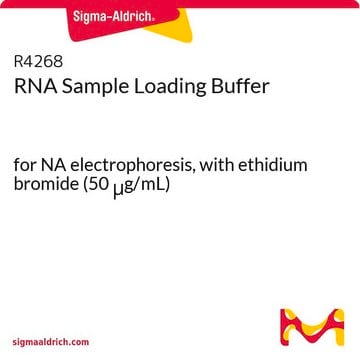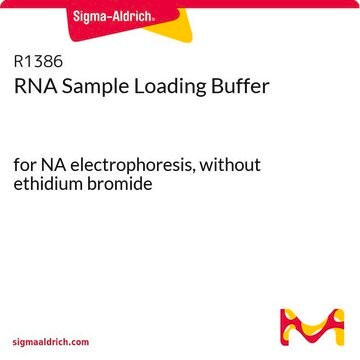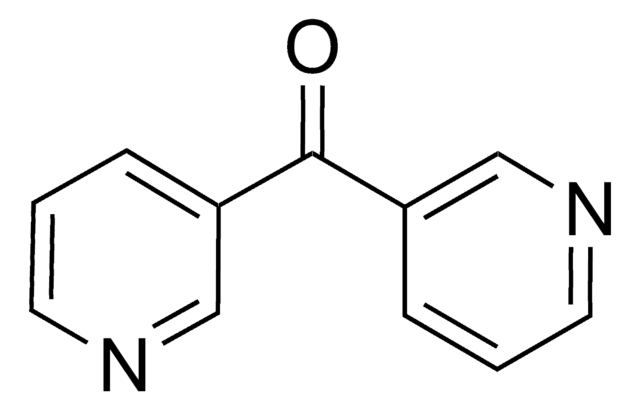G7654
Gel Loading Solution
for NA electrophoresis, solution
Sinônimo(s):
DNA Gel Loading Solution, Gel Loading Buffer
Faça loginpara ver os preços organizacionais e de contrato
About This Item
Código UNSPSC:
12161703
NACRES:
NA.25
Produtos recomendados
grau
for molecular biology
Nível de qualidade
forma
solution
concentração
6 ×
temperatura de armazenamento
2-8°C
Descrição geral
Gel loading solution is used as a tracking dye during electrophoresis. The dyes have a slight negative charge and will migrate the same direction as DNA, allowing the user to monitor the progress of molecules moving through the gel. The rate of migration varies with gel composition. Dilute 1:6 with sample before loading.
Aplicação
Suitable for use with agarose or non-denaturing polyacrylamide gel electrophoresis (PAGE), which may be part of Northern and Southern blot hybridization procedures.
Componentes
Gel loading buffer contains 0.25% bromophenol blue, 0.25% xylene cyanol, and 40% sucrose.
Outras notas
Band migration can be expected as follows:
On polyacrylamide gels, xylene cyanole comigrates with approximately 450-460 bp DNA, while bromophenol blue comigrates with 15-100 bp DNA. On 0.5 – 1.4% agarose gels, xylene cyanole comigrates with 4 kb dsDNA, while bromophenol blue comigrates with 300 bp dsDNA.
On polyacrylamide gels, xylene cyanole comigrates with approximately 450-460 bp DNA, while bromophenol blue comigrates with 15-100 bp DNA. On 0.5 – 1.4% agarose gels, xylene cyanole comigrates with 4 kb dsDNA, while bromophenol blue comigrates with 300 bp dsDNA.
produto relacionado
Nº do produto
Descrição
Preços
Código de classe de armazenamento
12 - Non Combustible Liquids
Classe de risco de água (WGK)
WGK 2
Ponto de fulgor (°F)
Not applicable
Ponto de fulgor (°C)
Not applicable
Certificados de análise (COA)
Busque Certificados de análise (COA) digitando o Número do Lote do produto. Os números de lote e remessa podem ser encontrados no rótulo de um produto após a palavra “Lot” ou “Batch”.
Já possui este produto?
Encontre a documentação dos produtos que você adquiriu recentemente na biblioteca de documentos.
Os clientes também visualizaram
Sambrook, J., et al.
Molecular Cloning: A Laboratory Manual, 6-6 (1989)
David R Macinga et al.
Antimicrobial agents and chemotherapy, 47(8), 2526-2537 (2003-07-25)
We have characterized an early series of 5,6-bridged dioxinoquinolones which behaved strikingly different from typical quinolones. The 5,6-bridged dioxinoquinolones inhibited Escherichia coli DNA gyrase supercoiling activity but, unlike typical quinolones, failed to stimulate gyrase-dependent cleavable complex formation. Analogous unsubstituted compounds
S Henry et al.
Vox sanguinis, 70(1), 21-25 (1996-01-01)
While screening Le(a+b+)Polynesian DNA samples for a candidate Se(w) allele, a point mutation (C571-->T) resulting in a new stop codon (Arg191-->stop) in the alpha(1,2)fucosyltransferase gene (FUT2) was identified. This point mutation resulted in the gaining of a new restriction enzyme
M K Bolla et al.
Journal of lipid research, 40(12), 2340-2345 (1999-12-10)
The apoE gene exhibits two common polymorphisms that have been associated with both coronary artery disease and Alzheimer's disease. The polymorphisms create the three allelic isoforms E2, E3, and E4 which are encoded by Cys;-Cys, Cys;-Arg, and Arg;-Arg at amino
Peter Konings et al.
Nature protocols, 7(2), 281-310 (2012-01-21)
We present a protocol for reliably detecting DNA copy number aberrations in a single human cell. Multiple displacement-amplified DNAs of a cell are hybridized to a 3,000-bacterial artificial chromosome (BAC) array and to an Affymetrix 250,000 (250K)-SNP array. Subsequent copy
Nossa equipe de cientistas tem experiência em todas as áreas de pesquisa, incluindo Life Sciences, ciência de materiais, síntese química, cromatografia, química analítica e muitas outras.
Entre em contato com a assistência técnica












